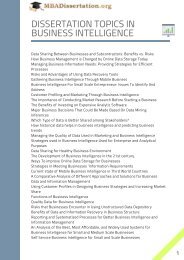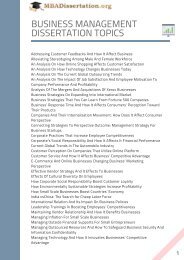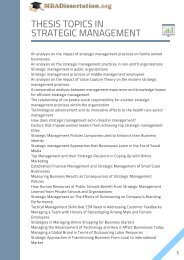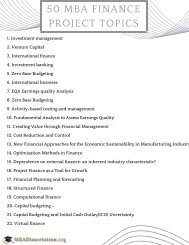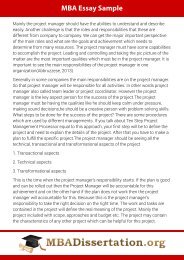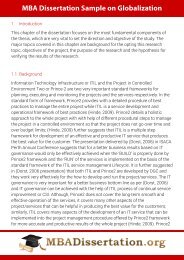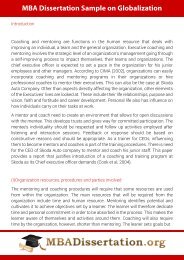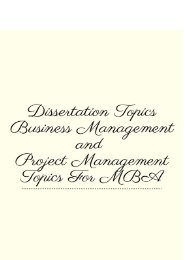MBA Dissertation Sample on Globalization
Take a look at this MBA dissertation Sample on Globalization. More samples here https://www.mbadissertation.org/sample-paper-on-organizational-behaviour/
Take a look at this MBA dissertation Sample on Globalization. More samples here https://www.mbadissertation.org/sample-paper-on-organizational-behaviour/
You also want an ePaper? Increase the reach of your titles
YUMPU automatically turns print PDFs into web optimized ePapers that Google loves.
<str<strong>on</strong>g>MBA</str<strong>on</strong>g><str<strong>on</strong>g>Dissertati<strong>on</strong></str<strong>on</strong>g>.org<br />
demands for necessary skills for each producti<strong>on</strong> levels, and (c)<br />
technologicalapplicati<strong>on</strong>s for producti<strong>on</strong> and supplier selecti<strong>on</strong> and relati<strong>on</strong> for each<br />
producti<strong>on</strong> plant (383-384).<br />
In the c<strong>on</strong>cept of globalizati<strong>on</strong>, Athukoralge (2007) explains that multinati<strong>on</strong>al<br />
companies allocate research and development activities as functi<strong>on</strong>s of its head<br />
office. Globalizati<strong>on</strong> processes provide potentials that attract diversificati<strong>on</strong> of other<br />
operati<strong>on</strong>s of these firms from their centralized positi<strong>on</strong>s to diversified selected<br />
locati<strong>on</strong>s. From the head office, technological skills realized from innovati<strong>on</strong> practices<br />
and other forms of knowledge gained are said to be determinants of the differential<br />
advantages these firms have in the global arena. These innovative practices are<br />
elaborated to include all levels of product development, marketing, sales and<br />
distributi<strong>on</strong>. Thus, these practices are said to be dependent <strong>on</strong> the capabilities of an<br />
organizati<strong>on</strong>. In this regard, diversified operati<strong>on</strong>s are seen to either demand<br />
adaptati<strong>on</strong> to foreign investments or establishment of new assets but which will<br />
operate according to the domestic operating c<strong>on</strong>diti<strong>on</strong>s existing in the selected<br />
locati<strong>on</strong> (169-170).<br />
Jaffe (2006) argues that this c<strong>on</strong>cept of globalizati<strong>on</strong> in support of the operati<strong>on</strong>s of<br />
multinati<strong>on</strong>al firms as <strong>on</strong>e that is being exploited by these corporati<strong>on</strong>s. It is informed<br />
that multinati<strong>on</strong>al companies generate a lot of income from operati<strong>on</strong>s diversified in<br />
various parts of the world unlike in their home country. Their large sizes have also been<br />
seen to model globalizati<strong>on</strong> structures around the globe. These firms that all begin as<br />
domestic enterprises, decide to go global for the purposes of increasing their market<br />
shares, sourcing for producti<strong>on</strong> materials and lower producti<strong>on</strong> costs (57).<br />
Multinati<strong>on</strong>al corporati<strong>on</strong>s have thus been accused of exploiting globalizati<strong>on</strong> in terms<br />
of technological transfers, exploitati<strong>on</strong> of resources in their host countries, exporting<br />
job opportunities in foreign lands and taking away sovereignty of countries. Some of<br />
these accusati<strong>on</strong>s have been elaborated as follows: technological transfer is said to<br />
go against the need of maintaining a differential advantage of a country’s<br />
technological strength; and resource exploitati<strong>on</strong> are directed towards overuse and<br />
polluti<strong>on</strong> of a country’s resource that endangers humanity (Jaffe, 2006: 58-60).<br />
Louise & Michael (2013) in their study attempt to c<strong>on</strong>vey trade differences found in<br />
home regi<strong>on</strong> in the c<strong>on</strong>text of finding business opportunities. The finding of their study<br />
informs that trade structures in home countries differ <strong>on</strong> different types of products. It<br />
is also revealed that these trade structures vary across regi<strong>on</strong>s or countries (25).<br />
Brown et al (2007) informs that presently, making c<strong>on</strong>siderati<strong>on</strong>s to deploy business<br />
operati<strong>on</strong>s in locati<strong>on</strong>s that have a differential advantage is a business strategy. For<br />
instant, in the manufacturing sector, setting up producti<strong>on</strong> plants through knowledge<br />
transfer techniques in developing countries is understood as a strategy that would<br />
produce good results within a short while (377). This is argued <strong>on</strong> the basis that<br />
operati<strong>on</strong>s management that involves subsidiary firms located in various countries




